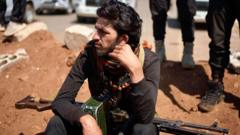The southern Syrian region of Suweida stands at a crossroads, with a fragile ceasefire holding amidst a backdrop of destruction and loss. The BBC has reported from near Suweida city, where sectarian violence between the Druze community and Bedouin tribes has left more than 1,000 people dead within a week. While Syrian government troops have been deployed to impose this ceasefire, the situation remains precarious.
During a recent attempt to approach Suweida, reporters encountered deserted villages, scorched businesses, and shell casings littering the roads – stark reminders of the conflict's toll. According to local military personnel, snipers from the Druze faction pose a constant threat as tensions simmer beneath the surface.
Armed Bedouin fighters gathered along the roadside, expressing their willingness to return to combat if hostilities resume. Many of them are demanding the release of Bedouin individuals they consider as hostages in the city, escalating fears of renewed violence.
Amid this unrest, humanitarian efforts continue with the Syrian Red Crescent extracting some injured individuals, yet the situation remains dire. Limited access to medical supplies is causing significant distress in hospitals struggling to cope with the inflow of wounded.
As Raed al-Saleh, minister of disaster management, emphasized the need for solidarity and collective effort to navigate through these turbulent times, the road to lasting peace and stability in Syria remains fraught with uncertainty. The hope for a peaceful resolution is overshadowed by the grim reality on the ground, where the potential for further bloodshed looms large.
During a recent attempt to approach Suweida, reporters encountered deserted villages, scorched businesses, and shell casings littering the roads – stark reminders of the conflict's toll. According to local military personnel, snipers from the Druze faction pose a constant threat as tensions simmer beneath the surface.
Armed Bedouin fighters gathered along the roadside, expressing their willingness to return to combat if hostilities resume. Many of them are demanding the release of Bedouin individuals they consider as hostages in the city, escalating fears of renewed violence.
Amid this unrest, humanitarian efforts continue with the Syrian Red Crescent extracting some injured individuals, yet the situation remains dire. Limited access to medical supplies is causing significant distress in hospitals struggling to cope with the inflow of wounded.
As Raed al-Saleh, minister of disaster management, emphasized the need for solidarity and collective effort to navigate through these turbulent times, the road to lasting peace and stability in Syria remains fraught with uncertainty. The hope for a peaceful resolution is overshadowed by the grim reality on the ground, where the potential for further bloodshed looms large.


















